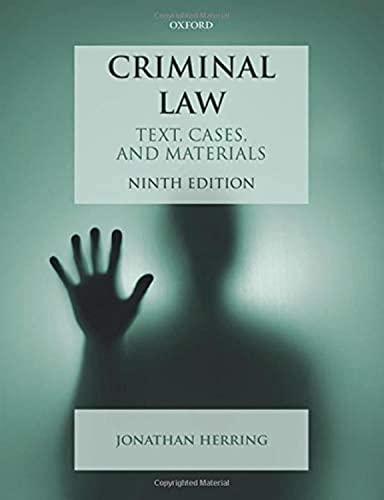Question
43. The parol evidence rule is based on the theory that any oral agreement was abandoned when the contact was written. a. True b. False
43. The parol evidence rule is based on the theory that any oral agreement was abandoned when the contact was written.
a. True
b. False
44. A bilateral contract is essentially an exchange of enforceable promises.
a. True
b. False
45. Offers, acceptances of offers, and revocations of offers are all effective when mailed in a properly-addressed envelope bearing the proper amount of postage.
a. True
b. False
46. In the absence of an agreement to the contrary, weather conditions constitute a risk that is assumed by a contracting party.
a. True
b. False
47. Certain persons cannot make contracts that will bind them.
a. True
b. False
48. A factual incapacity may exist when, because of a mental condition caused by medication, drugs, alcohol, illness, or age, a person does not understand that a contract is being made or understand its general nature.
a. True
b. False
49. If either the offeror or offeree dies or becomes mentally incompetent before the offer is accepted, the offer is automatically terminated.
a. True
b. False
50. Agreements not to compete are always void.
a. True
b. False
51. In general, an acceptance occurs when:
a. a particular form of words is stated to the offeror.
b. a particular mode of expression is made to the offeror.
c. the offeree reserves the right to reject the offer.
d. a clear expression of the offeree's agreement to be bound by the terms of the offer occurs.
52. The phrase "time is of the essence" means that:
a. the court is in a hurry to dispose of the case.
b. performance under the contract at the times specified in the contract is vital or essential.
c. the contract expressly states that time is of the essence.
d. the price stated in the contract is subject to change without notice.
53. Private lotteries, which generally are held to be illegal, involve three elements:
a. prize, chance, and consideration.
b. return, skill, and wager.
c. prize, skill, and consideration.
d. attractive return, minimal involvement, and skill.
54. A contract requires:
a. an offer.
b. an acceptance.
c. both an offer and an acceptance.
d. an agreement manifested by the written or spoken words of the parties.
55. A discharge by agreement can occur in any of the following situations except:
a. death of the obligor.
b. accord and satisfaction.
c. release.
d. mutual rescision.
56. Even if a contract appears legal on its face, it may be unenforceable if:
a. the illegal contract has not been performed.
b. the contract has been partially performed.
c. the contract has been fully performed.
d. the contract has an illegal purpose.
57. Examples of illusory promises include:
a. cancellation provisions.
b. apparent promises.
c. conditional obligations.
d. real obligations.
58. When a contract proves to be a bad bargain:
a. the injured party is never bound by the terms of the contract.
b. courts will always imply terms that are necessary to avoid hardship.
c. parties are generally still bound by the terms of the contract.
d. the contract must be rewritten.
59. When a buyer assigns the right to goods under a contract, the buyer's liability to make payment to the seller is:
a. transferred to the third party.
b. terminated.
c. still in effect.
d. shared equally with the third party.
60. Liz agrees to cook 20 dinners for Brian, and in exchange, Brian will repair all of the plumbing in Liz's house. Liz and Brian's 'deal' has:
a. insufficient consideration, because cooking twenty dinners is not worth as much as repairing all of the plumbing in Liz's house.
b. insufficient consideration, because this kind of bargain is against public policy.
c. insufficient consideration, because there is a clear lack of any bargain.
d. sufficient consideration, because Liz has promised something of value.
61. Which of the following is not consideration for a present promise?
a. a good faith adjustment
b. compromise and release of claims
c. the promise to pay one's child support obligation, consistent with a pre-existing court order.
d. the performance of a requested act
62. In most bilateral contracts, the performances of the parties are __________.
a. conditions precedent
b. conditions subsequent
c. recurrent conditions
d. concurrent conditions
63. A(n) _______ contract is a take-it-or-leave-it contract that is unenforceable because it is deemed to be too harsh or oppressive to one of the contracting parties.
a. unilateral influence
b. bilateral influence
c. adhesion
d. non-compete
Step by Step Solution
There are 3 Steps involved in it
Step: 1

Get Instant Access to Expert-Tailored Solutions
See step-by-step solutions with expert insights and AI powered tools for academic success
Step: 2

Step: 3

Ace Your Homework with AI
Get the answers you need in no time with our AI-driven, step-by-step assistance
Get Started


